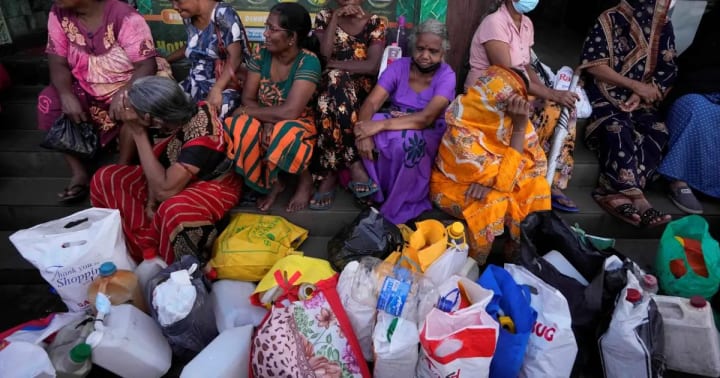

INTRODUCTION
Sri Lanka is a beautiful island nation located in the Indian Ocean, known for its rich cultural heritage, stunning beaches, and diverse wildlife. For many years, the country was considered one of the fastest-growing economies in South Asia, with a rapidly expanding tourism industry, a thriving export sector, and significant foreign investment. However, in recent years, Sri Lanka has faced mounting economic difficulties, culminating in a default on its loans and a severe economic crisis. In this story, we will explore the factors that led to Sri Lanka's downfall and the lessons that can be learned from this cautionary tale.
Sri Lanka's Economic Downfall
Once upon a time, there was a small island nation called Sri Lanka, which had a rich history and culture. Sri Lanka was known for its beautiful beaches, vibrant cities, and friendly people. However, as time passed, the country began to experience economic difficulties.

The government of Sri Lanka had been borrowing heavily from foreign countries to finance development projects and social welfare programs. The country was also facing high levels of corruption and mismanagement, which resulted in a lack of accountability and transparency in the government.

As the debt burden continued to increase, Sri Lanka found it increasingly difficult to repay its loans. The country's economic growth had slowed down, and its foreign reserves had dwindled. Moreover, the COVID-19 pandemic had hit the country hard, leading to a decline in tourism revenue and a fall in exports.
Despite warnings from international financial institutions, Sri Lanka continued to borrow heavily, hoping that economic growth would pick up and enable it to repay its debts. However, this did not happen, and Sri Lanka found itself struggling to meet its debt obligations.
Finally, in a fateful turn of events, Sri Lanka defaulted on its loans. The country's credit rating was downgraded, and its ability to borrow in the international markets was severely restricted. The government had to implement austerity measures, which resulted in cuts to social welfare programs and infrastructure projects.
The people of Sri Lanka were deeply affected by the economic crisis. Unemployment rates rose, and inflation soared, making it difficult for families to make ends meet. The government's popularity plummeted, and there were protests and demonstrations across the country.
The road to recovery was long and arduous. Sri Lanka had to undertake economic reforms, improve governance, and restore the confidence of international investors. It took several years, but Sri Lanka eventually emerged from the crisis stronger and more resilient than before. The country learned the hard way that borrowing beyond its means was not a sustainable economic strategy, and that good governance and sound fiscal policies were essential for long-term economic growth and development.
LESSON FOR OTHER COUNTRIES
The story of Sri Lanka's economic downfall holds important lessons for other countries around the world. First and foremost, it demonstrates the dangers of borrowing beyond one's means, particularly when coupled with corruption and mismanagement. While borrowing can be an effective tool for financing development and growth, excessive borrowing can lead to unsustainable debt burdens, making it difficult for countries to meet their obligations and fund essential public services.
Secondly, the Sri Lankan experience underscores the importance of good governance and transparency in the management of public finances. The lack of accountability and transparency in Sri Lanka's government contributed to a culture of corruption and inefficiency, undermining public trust and damaging the country's economic prospects.
Finally, the story of Sri Lanka's economic crisis highlights the need for countries to diversify their economies, build resilience, and prepare for unforeseen shocks such as natural disasters or pandemics. The COVID-19 pandemic had a severe impact on Sri Lanka's economy, highlighting the vulnerability of countries that rely heavily on a single industry or sector.
In short, the lessons from Sri Lanka's economic downfall are clear: sound fiscal management, good governance, and economic diversification are essential for long-term economic growth and stability. Countries that ignore these lessons do so at their peril.
About the Creator
Noah
"Wordsmith and lifelong learner, weaving tales with authenticity and truth. Passionate about the transformative power of storytelling. Let's create something beautiful together."
Thank you for joining me on this journey.
Reader insights
Outstanding
Excellent work. Looking forward to reading more!
Top insights
Excellent storytelling
Original narrative & well developed characters
Expert insights and opinions
Arguments were carefully researched and presented
Heartfelt and relatable
The story invoked strong personal emotions






Comments
There are no comments for this story
Be the first to respond and start the conversation.